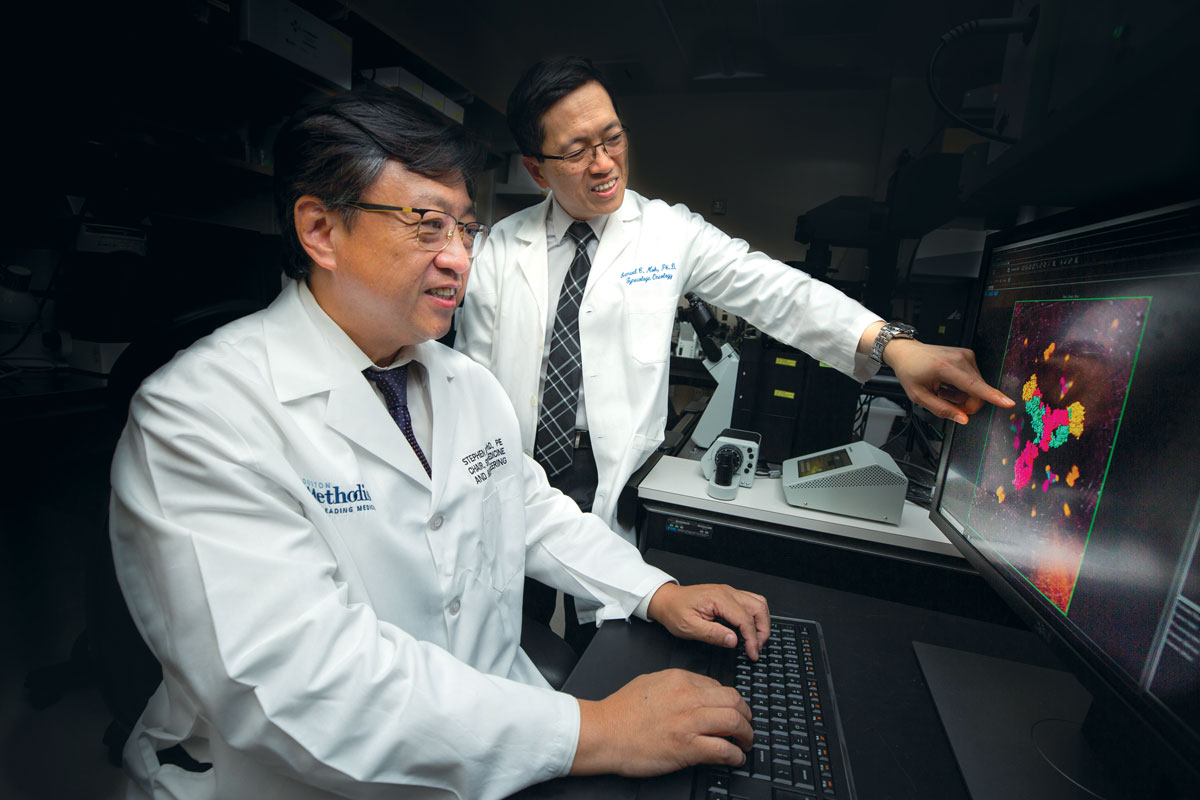Share this story



Science in Service
of
Medicine
President & CAO Letter
Metrics 2019
Cycle of a Cure
From Discovery to Clinic


Introduction

Precision Medicine


Introduction

Tracing Tau to Tackle Alzheimer's Disease

Translational Imaging Center Revamps for Revolutionary 7T MRI

Hope for Slowing ALS

The Heart of Progress: Innovative Valves Create a Legacy for the Future

Test-Driving Carbon Fiber Materials in Space

Lab-on-a-chip Shines Light on Bystander Effect

Creating an Antibody to Fight Silent Killers

A New View of Strep

Translational Luminaries
result



President’s letter
2021 Metrics
Cycle of a Cure
Visionary Gifts

Discovery to Clinic

Innovative Education

Translational Luminaries
Introduction
Building Blocks for Bone Regenration
RNA Therapeutics
Mobile App for Healthy Habits for Breast Cancer Survivors
Designing a Flexible Approach to Breast Reconstruction
Introduction
Tracing Tau to Tackle Alzheimer's Disease
Translational Imaging Center Revamps for Revolutionary 7T MRI
Hope for Slowing ALS
The Heart of Progress: Innovative Valves Create a Legacy for the Future
Test-Driving Carbon Fiber Materials in Space
Lab-on-a-chip Shines Light on Bystander Effect
Creating an Antibody to Fight Silent Killers
A New View of Strep
result

Creating an Antibody
to Fight Silent Killers
Houston Methodist and MD Anderson join forces to block MFAP5 protein in ovarian and pancreatic cancers




Stephen Wong, PhD, from Houston Methodist Cancer Center, and Samuel Mok, PhD, from The University of Texas MD Anderson Cancer Center, are collaborating to create an antibody as a new type of immunotherapy
Known as two of the most lethal cancers, ovarian and pancreatic cancers are called “silent killers,” often going undetected until too late to treat. Taking on this challenge, two cancer scientists at Houston Methodist and The University of Texas MD Anderson Cancer Center have diligently sought more effective late-stage treatments, resulting in their creation of a new monoclonal antibody.
In a study published in the July 22 issue of
Clinical Cancer Research
, co-corresponding authors Stephen T.C. Wong, PhD, from Houston Methodist Cancer Center, and Samuel Mok, PhD, from The University of Texas MD Anderson Cancer Center, reported finding a new type of immunotherapy to fight the two deadly malignancies. They developed the monoclonal antibody to block the action of a protein, called MFAP5, which is secreted by the cells surrounding and supporting tumors in these two malignant cancers.The MFAP5 protein appears to trigger the formation of the surrounding elements that supply and stimulate the tumor as it grows and spreads.
The MFAP5 protein appears to trigger the formation of the surrounding elements that supply and stimulate the tumor as it grows and spreads. The monoclonal antibody 130A developed and patented by Wong and Mok is able to block MFAP5, preventing new blood vessels and excess tissue from forming and thereby cutting off the tumor’s support for continued growth.
Mok, endowed professor of gynecologic oncology and reproductive medicine at MD Anderson, states, “MFAP5 promotes fibrosis in ovarian and pancreatic cancers, and fibrosis promotes progression, chemoresistance and reduces survival of people with these cancers. By blocking this secretory protein with an antibody, we can treat the tumor by targeting multiple cellular types—fibroblasts and blood vessels—in the tumor microenvironment.”
Having demonstrated the feasibility of using their monoclonal antibody to target MFAP5, the researchers are in the process of designing and generating an anti-MFAP5 antibody that can be used as a treatment in humans. They aim to have it ready for efficacy and toxicity testing by the end of 2019 and begin a Phase I clinical trial in 2020.
“The convergence of biological science, computational science and engineering has allowed us to achieve such translational discovery,” Wong said.
Pinch to zoom image


We found that blocking MFAP5 enhances the effectiveness of chemotherapy treatments and suppresses tumor growth in ovarian and pancreatic cancers, as well as inhibits progression of these two cancers in mice. This new immunotherapy drug targets supporting cells surrounding a tumor rather than just the tumor cells alone.

—
Stephen T.C. Wong
, PhDJohn S. Dunn, Sr. Presidential Distinguished Chair in Biomedical Engineering
Professor of Computer Science and Bioengineering in Oncology
Cancer Center
Houston Methodist
More from Discovery to Clinic
Contact Us
© 2021. Houston Methodist, Houston, TX. All rights reserved.
Privacy & Disclaimer
.










